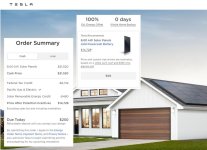Bowling4Bikes
Steee-riiike!
I was told the installation fees are similar if you get 1 or 30 panels installed. That prompted me to install more than I thought I'd need. Glad I did though. It's given me flexibility to install a heat pump in the future which can eliminate a big use of gas in my house (plus get a/c).
Efficiency is getting better all the time. My LG 380's at 21.0% efficiency are pretty good but the top tier ones look to be in the 400W, 22% efficiency range. Thinking that I'm going to have these for a long while, I got the highest wattage and efficiency my guy could/would get me.
Efficiency is getting better all the time. My LG 380's at 21.0% efficiency are pretty good but the top tier ones look to be in the 400W, 22% efficiency range. Thinking that I'm going to have these for a long while, I got the highest wattage and efficiency my guy could/would get me.
Last edited:



